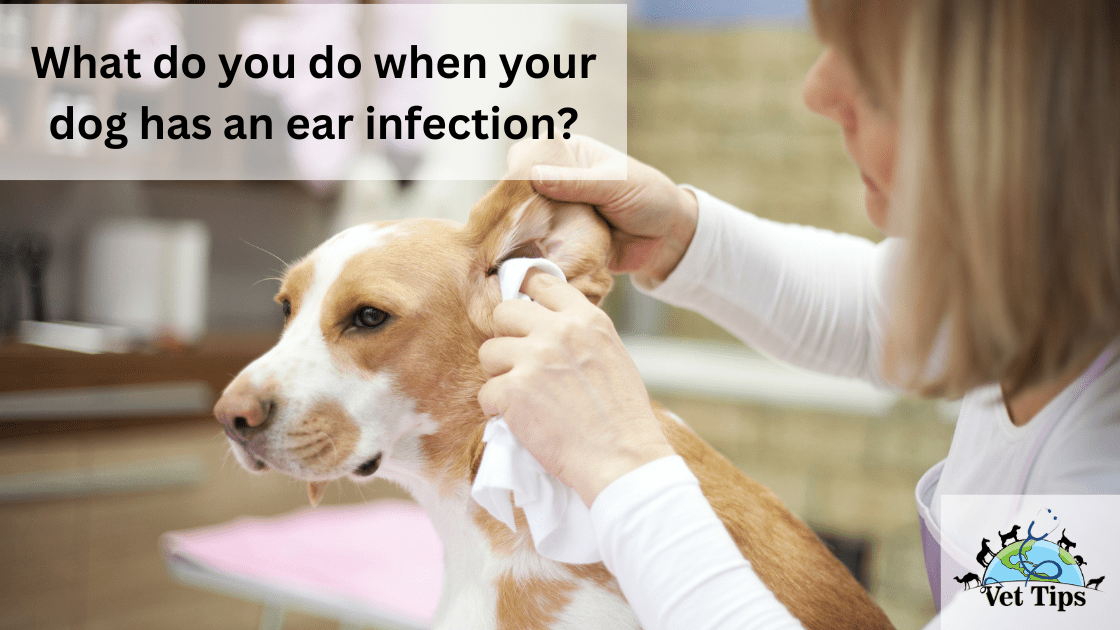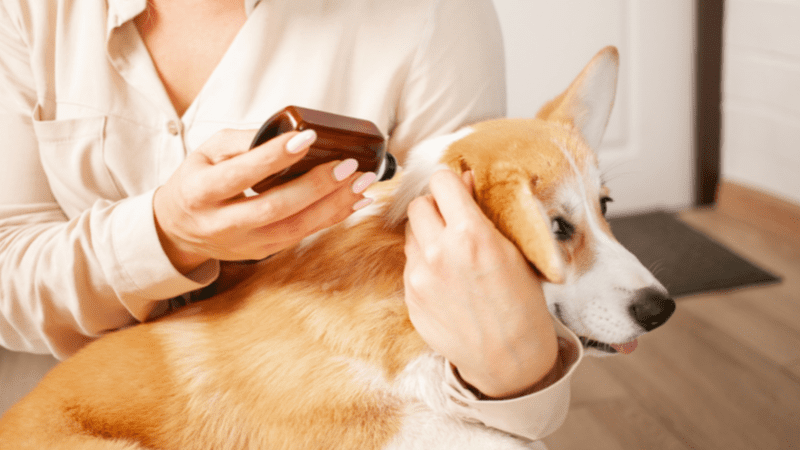In this article, we tell everything about What do you do when your dog has an ear infection?. So continue reading to learn more about it.
Does your dog have itchy, smelly, or painful ears that don’t get better? If you answered yes, then do not worry. We are here to sort that out. One of the main reasons canine owners take their dogs to the doctor is because of a dog ear infection.
Most dog owners are frustrated with how difficult it can be to get rid of chronic ear problems. This is because chronic ear infections are usually a sign that something else is wrong. Chronic ear infections in dogs also act as an alerting system to tell owners that some other system of your canine companion is under stress.
To help you heal your dog’s ear infection well, you need to take some necessary steps.
- Identify and diagnose the root cause of the ear infection.
- The next step is to treat your dog’s ear infection and eradicate the root cause
These are some of the prevalent types of ear issues for dogs:
- Yeast Overgrowth: Leads to itchy ears and some time infection in severe condition
- Bacterial Infection: Lead to bad-smelling greenish or yellow discharge.
- Foreign Bodies: Usually lead to shaking of the dog’s head to get rid of the debris.
- Aural Hematoma: Leads to a type of bruise that forms a pool of blood between the skin and the ear flap cartilage.
- Ear Mites: Leads to head shaking and scratching of ears.
- Diet: This also lead to ear infections. If the ration/feed is moldy or not good processed /cooked
- Anatomical structures: If your dog has extended ear flaps, like a Cocker Spaniel, he’ll be more prone to ear infections
- Multiple Chronic Diseases lead to ear infections: Chronic conditions like autoimmune disease or hypothyroidism can also result in ear infections.
Fact: Healthy ears shouldn’t need cleaning too often. A little wax is usual to present
What to do if your dog has an ear infection? Or What’s the treatment?
Mild ear infections are not so severe, so they must be treated at home first before visiting a veterinarian. There are many solutions to sort out that problem. All of them are given below:
Topical Remedies
These topical ointments or remedies provide some soothing effect and mostly treat the infections in the epidermal layer of skin usually caused by fungus. They are also useful in parasitic or bacterial infection, or they are beneficial in injury. The first line of treatment is to apply topical ointment, whether it is NSAID or steroid.
Calendula Tincture
Calendula tincture helps in relieving the pain and reduce inflammation. It also has antimicrobial properties that prevent infection. The procedure of using calendula for ear infections is:
- Buy herbal tincture calendula.
- Add 6 to 9 drops of calendula tincture to a medium-sized cup of lukewarm filtered water.
- Use a dropper or sponge and insert it into the ears.
Green Tea
It helps in reducing inflammation due to its antioxidant properties. The procedure of using green tea for ear infections is:
- Boil 8-10 oz of water and add two green tea bags.
- Let the tea settle for a few minutes and cool it to a lukewarm temperature.
- Insert some of that solution into the ear canal with the help of a sponge or syringe.
Oil Of Oregano
Oil of oregano is the best natural existing antibiotic. The procedure of using Oil of Oregano for ear infections is:
- Add 1-2 drops to 0.5 oz of warm pure aloe vera juice.
- Clean the ear thoroughly with a cotton ball soaked in the mixture.
Grapefruit Seed Extract
Grapefruit seed extract, also known as GSE, is an excellent natural antioxidant. It’s also antiviral, antibacterial, and antifungal. The procedure of using GSE for ear infections is:
- Mix 10-12 drops of GSE with .05 oz of pure aloe vera juice.
- Use it to clean the ears.
To use it internally/systemically, add 4 to 6 drops of GSE to your dog’s food.
Vinegar And Water
Vinegar can help reduce discomfort and itch during the dog’s ear infection. The procedure of using Vinegar for ear infections is:
Mix 1 part filtered or spring water and 1 part vinegar. Organic apple cider vinegar is the right choice.
- Clean the infected/affected ear with a cotton ball soaked in the mixture.
Mullein Drops
Mullein drops work best for most ear infections in dogs. You can buy one at health food stores or make your own.
To make your own:
- Pack flowers and leaves of mullein in a jar(glass jar preferred) and cover with olive oil. You can add a clove to increase antibiotic effectiveness.
- Let the mixture rest for 3 to 4 weeks.
- Mix well and apply several drops of the warmed oil into the ear canal daily after straining.
Orally given remedies
Aloe vera juice
- Aloe vera juice is full of polysaccharides, which reduce inflammation. They also promote cell regeneration. Aloe vera juice can help with your dog’s digestion and provide immediate relief.
Other than that, Prebiotics, Probiotics, Enzymes, Supplements, Licorice Root, etc. should be given orally to enhance gut efficacy and to reduce systemic diseases that lead to ear infections in dogs
Homoeopathic Treatments For Dog Ear Infections:
In acute or minor ear, flare-ups use these homoeopathic drugs for better results. Use a 30C potency.
- Belladonna
- Pulsatilla
- Hepar Sulphuris
All of these affect best and give positive results in acute dog’s ear infections.
Do not clean your ears if your dog is not comfortable. Visit the Veterinarian in that condition. Excessive or over-cleaning of ears can cause skin irritation and inflammation. If you must clean your dog’s ears, wipe them off with a little organic witch hazel on a pad or a cotton ball. Never use anything smaller than your index finger inside your dog’s ear. Never use Q-tips to clean dog ears. Otherwise, you damage the dog’s ear canal, which leads to infection or inflammation.
Lifestyle
A dog with a natural lifestyle is less likely to get an ear infection. Make some lifestyle choices that reduce stress:
- Feed your dog whole, raw food.
- Do not vaccinate too much. Talk to your doctor about titers and avoid unnecessary vaccines.
- Use medicines with caution, such as antibiotics and pesticides. Avoid them whenever possible.
- Avoid any exposure to chemicals and pesticides in your dog’s environment
Tell us in the comment section, how you like our article about, “What do you do when your dog has an ear infection?”
For similar posts, click here.
For the source file, click here.









One thought on “What do you do when your dog has an ear infection?”